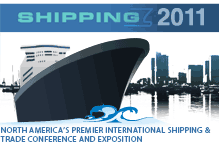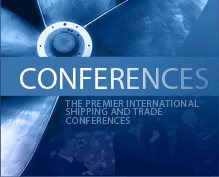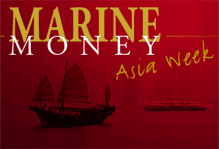
Investment in shipping shares, stupidity or foresight?
by Ragnhild Wiborg, ODIN Forvaltning AS
It may seem that the biggest fools in business are ship owners, only surpassed by investors in shipping shares.
ODIN Forvaltning is one of the largest financial shipping investors in Scandinavia. We have large holdings in many of the publicly owned shipping companies in Norway and Sweden.
In this address to this distinguished shipping community, I will discuss why we have taken these positions. I will share with you our thoughts about what we expect the shipping companies to do in the future, and what we expect they will not do.
Continue Reading
Herding Cats
When Jim Lawrence interviewed me a number of years ago for a job as a summer intern for Marine Money, he invited me for a clandestine lunch at a smoky little bar in Old Greenwich, Connecticut frequented by shipping whales and pilot fish. Leaning across the table, shoulders up, head darting suspiciously from side to side, he whispered, as if someone from Lloyd’s Shipping Economist might have been eavesdropping, “The purpose of Marine Money is to link together shipping and the capital markets.” As this month’s cover reflects, the mandate was a taller order than herding cats, but Jim was on his way and I was invited to join the team. Since then, the mission has been pursued with enthusiasm and unflinching determination, and I have watched our business grow from a small newsletter to the premier provider of intelligence to the ship finance community.
Continue Reading
SCRAPPING UNDER FIRE
by Laura Parker
The scrap value of ships has historically been like a magic elixir in the shipping industry. Residual value is relied upon by bankers and owners as a way to trim the downside off of amortizing shipping loans and to limit investment risk. Scrap value has long been an essential factor for improving, at least potentially, the balance between the supply of and demand for tonnage.
But this often taken for granted feature of shipowning has come under fire. An industry that has historically been out of the sight and mind of society is now being closely scrutinized by policy makers and environmental groups as being barbaric and one where worker safety and environmental protection are obstacles that stand in the way of profit.
Continue Reading
OILING THE MULTIPLIERS
by Geoff Uttmark
There’s nothing like earnings to boost share price, but short of earnings, the next best thing is improved prospects of earnings. No where has this been more apparent lately than the effect the rise in price of a barrel of oil has had on the offshore sector. In real terms, oil was cheaper than it had even been back in January/February of this year. That is remarkable in and of itself, given that even the “greenest” forecasters concede that fossil fuels like oil and coal will dominate the world’s energy balance well towards the middle of the next century. Hence, all the fuss about the recent “recovery” in the price of oil is more about the fact the price is up about 50% from the $11 per barrel level, rather than the fact that oil is not priced anywhere near its true value. To a commodity trader, oil’s value is today’s price in the pits. But to oil companies – including all who feed from the long trough that starts at E&P and ends at R&M – oil should be valued by the cost of maintaining the Reserve/ Depletion Ratio at an acceptable level, be it a global, geographic or country-specific subset of the inevitably finite resource. Continue Reading
Measuring the Risk in a Shipping Investment
Part 2 of a two-part series
by Geoff. Uttmark
Risk that is measurable is manageable because it can be priced. Risk is necessary and in fact essential, if investment returns above the risk-free 30-year U.S. T-bond rate are to be achieved. Confronting uncertainty has rarely discouraged ship owners who throughout history have been definers of the relationship between risk and reward. This is why sailing directions to prized destinations like the Spice Islands were closely guarded secrets. The business of operating ships is still chancy even today. So compared to personal physical risk taking, little wonder that financial risk taking using other peoples’ money is occasionally treated somewhat nonchalantly. The tsunami of high-yield offerings by companies that never produced returns on debt even close to the coupon rate of their newly issued bonds is a case in point. Subsequent revelations like “Based on current levels of freight revenues and anticipated market conditions, the company expects that its liquidity requirements for the next 12 months will not be met by cash flow from earnings of the vessels” (Pacific & Atlantic 20-F) become inevitable when supporting assumptions and projections on which the deal is based are highly problematic in the first place. There are many such deals.
Continue Reading
Equity – July 1999
Equity – July 1999 Continue Reading
Bargain Hunting in the Far East
by Richard Lawrence, Overlook Investments Limited, Hong Kong
Richard Lawrence was featured in a full-page Wall Street Journal profile on April 26, 1999. The following appeared in The Gloom, Boom and Doom Report, published in Hong Kong by Marc Faber Limited.
When Marc Faber asked me to consider writing a piece for The Gloom, Boom & Doom Report on small companies in Asia, two thoughts entered my mind.
My immediate reaction was why in the world should I consider exposing my leprosy to the public by admitting that I invest in small companies in Asia for a living. Better that I suffer ignominy in private, isolated from the investment community. After all, I have a family to protect, if not a reputation. My loyal, yet depressed, group of investors have heard enough of my exhortations about the valuations, and quality of certain select managers. Why try and sell this snake oil to innocent bystanders?
Continue Reading
Bilaterals – June 1999
Bilaterals – June 1999 Continue Reading
Equity – June 1999
Equity – June 1999 Continue Reading
HEAD TO NORWAY TO GO GLOBAL
The buzz word these days may be “globalization” but in geo-politics the reality is trade blocs in various shapes or forms. NAFTA, EU and ASEAN are the heavyweights, but there are a host of others. If the first and foremost reason for a country to join a trade bloc is to gain some kind of comparative advantage, be it preferential duties, cheaper labor or access to larger market, etc., then the opposites should apply for those countries who do not join. The very advantages of trade blocs are therefore their greatest detraction since they are, by definition, exclusive to non-members, hence impediments to free and open trade on global basis. The very notion of trade blocs is reminiscent of the old colonial spheres of influence that have carried over to the present time. Despite the many rationales to the contrary, the very existence of trade blocs seems to contradict, in fact repudiate, some of the raison d’être for the WTO (formerly GATT) initiatives that trace back to the first round in 1947. Yet, trade blocs proliferate.
Continue Reading







